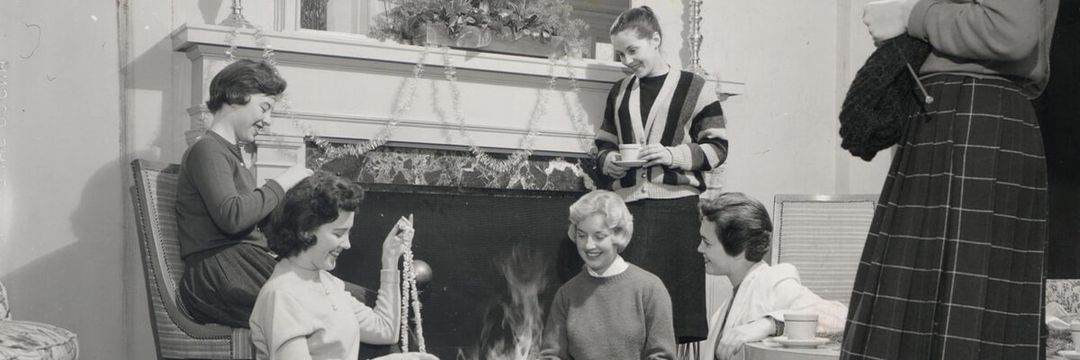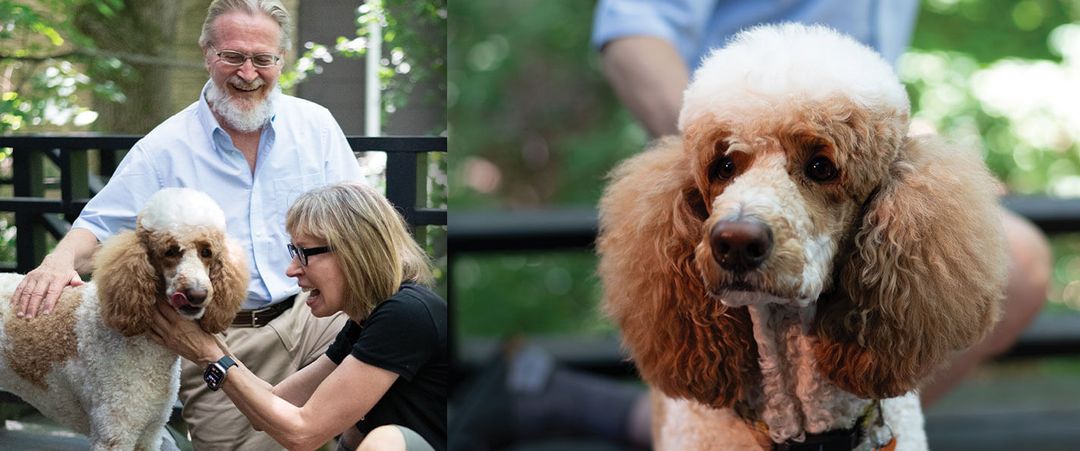Thank You, Professor!
By Badger Insider Readers
College is an impressionable time, and a professor can make or break your experience. In its history, the UW has had no shortage of amazing professors who share their knowledge and passion with their students — ultimately inspiring us all to live the Wisconsin Idea.
Every Badger grad has that one professor who had a profound influence, whether through inspiring lectures, sage advice, or humor. For this issue of Badger Insider, readers shared with us the thank-you notes they wish they’d given to their favorite professors. Ever wish you could thank the UW professor who changed your life? Now’s your chance.
Communication Arts
Lee Sherman Dreyfus ’49, MS’52, PhD’57, was the one professor who took me under his wing and had faith in my ability and became my undergraduate advisor. I also ended up working for him as the alumni director at UW–Stevens Point. Learned more about life and living from him than anyone in my life.
Rick Frederick ’66
Loudon, Texas
To Professor Russell Merritt, re: Comm Arts 150: History of Film, fall semester 1968. Your enthusiasm for the subject was infectious. Watching you demonstrate the “Shuffle Off to Buffalo,” dancing across the stage in our lecture hall, inspired a love on my part that endures to this day for Depression-era Warner Bros. musicals and the work of Busby Berkeley. I even managed to see the most wonderful Ruby Keeler on stage in a Broadway revival of No, No, Nanette back in 1971!
Jim Charne ’72
Madison, WI
Dear Professor Lucas,
I am writing to express my heartfelt gratitude for being the most influential professor, counselor, and advisor during my eight years of pursuing my PhD in the Department of Communication Arts (1987–95). You provided me with an outstanding role model for what it means to be a teacher, researcher, scholar, and relentless advocate for the importance of the study of rhetoric and public address. Throughout my time at the UW, you taught me many important lessons through word and deed: the inextricable connection between clear thinking and clear writing, the significance of considering the multiple layers of context in all research and writing situations, and the criticality of raising important questions and then pursuing them with passion and commitment to uncovering the truth. As your research assistant, I learned how to approach searching for rare texts and, in the process, befriended many librarians along the way. This experience informed my approach to researching my dissertation on Frederick Douglass, which you directed with grace and an insistence on precision and leaving no lead unexamined.
I want you to know that you fundamentally changed the direction of my life. I went on to pursue becoming a professor and scholar, and eventually became a higher education administrator. Throughout my career, I have found myself often reflecting on the many ways you influenced my professional life. You told me once that earning a PhD would “open doors that I could never have imagined.” I know that the doors that opened for me throughout my career would not have been available to me without your many contributions to my life during my time at UW–Madison. I am profoundly thankful for all you did for me while I was under your tutelage and guidance and for your continued friendship.
With gratitude,
Greg Lampe PhD’95
Madison, WI
Economics
Hans Schmidt, a lecturer in Economics 10B. He had an amazing ability to profess and lecturer with no visible notes … sharing his knowledge with engaging stories to emphasize his point. He lectured in Commerce Building room 10 (a huge lecture hall). I grant him an A for his effort!
Richard Markos ’64, MS’67
La Crescent, Minnesota
The professor who had the biggest positive impact on me was James Stern, who taught labor economics. He was an excellent lecturer, supported by a great TA. He once took me and a classmate to an arbitration he was doing, in his professional non-educational role as an arbitrator. His long-term effect on me included becoming a union steward while enrolled at the UW, a personnel representative, right after graduating, and eventually president and chairman of two separate companies.
Bill Piernot ’77
Westminster, Colorado
As a graduate student, I took labor economics from Professor W. Lee Hansen ’50, MS’55 in 1979. It was a large class mixed with both graduate and undergraduate students. At least one day each week, Professor Hansen's lecture was rooted in a Wall Street Journal article or some other publication that related the subject matter to a current topic. His style allowed the "theories" of the text to come to life in through his lectures and he made the class meaningful and memorable. In one of his classes, an apologetic Professor Hansen begged our forgiveness because the class size was too large and he would not be able to assign a meaningful research paper for the semester. When the audible sigh of relief was heard along with some scattered applause, Dr. Hansen looked out at us and told us in a heartfelt and sincere voice that he truly was remorseful about not being able to assign a research paper because of the richness of the learning that typically arose from committing oneself to doing a thorough analysis of a relevant topic.
I only had that one class with Dr. Hansen. But, he stood out as someone who deeply cared about his students and the educational experience. Now, almost forty years later, I can vividly recall his lecture style and his deep concern that his students come away with practical knowledge and that they actually learn something in his course. Beginning this fall, I am teaching a graduate level Human Resources class for MBA candidates as an adjunct professor. I am hoping to model my own teaching style after Dr. Hansen. If someone remembers something I had contributed forty years after the fact, I know I would consider that a huge success!
Mark Esselman MS’80
The Woodlands, Texas
History
My undying Thanks to History Professor W. Sachse (deceased) whose voice and confidence in me, cast the deciding vote to allow me to remain in school while facing an academic probation hearing board in 1951. His action provided the right to remain in school and the direction to my degree earned in 1955.
Baker Urdan ’55
Charlevoix, Michigan
My thanks go out to Professor Senn, my junior year, 1966. Up until then, I was just taking courses to fulfill my BA degree requirements. Professor Senn delivered the gift of European history and Russian. His ability to set the stage was comparable to a Russian novel ... with every course I took, I was able to make Russian history my major. I am still immersed in history from those years and eras ... and thinking back to those years puts a huge smile on my face. So thank you, Professor Senn. Flash forward 35 years, I find myself back on the UW–Madison campus, bringing my youngest daughter there to begin her undergraduate years. I looked up my Professor Senn in the yellow pages ... there he was. But fearing he wouldn't remember me or my maiden name, I let the past be the past ... I didn't want anything to dampen how I spent my best years in Madison with my favorite professor.
Helene Supon Blumenfeld ’68
Voorhees, New Jersey
History professor Norman Risjord was my favorite teacher at UW. He had a unique way of making American history incredibly interesting and fun because he had such a great oratory style and command of his knowledge. He had a booming voice, was very animated and his classes were in high demand. My favorites were his Representative Americans classes where he would give biographical sketches and insight (and many funny stories) on everybody from George Washington to PT Barnum. Shortly after I graduated, I was delighted to find out he was broadcasting his History 101 and 102 courses on Wisconsin public radio. I used to set a cheap cassette recorder on a timer so that I could capture Professor Risjord’s colorful discussions once again. Thanks for making American history both fun and enlightening!
Matthew Kyler ‘79
Mendota Heights, Minnesota
In 2014 I wanted to challenge myself so I enrolled in a course for upperclassmen and graduate students (I was a freshman) called History 412: History of American Education. Fortunately, the professor was kind enough to allow me in. I also finessed my way into the discussion section that he led so that I could have the best experience and it remains my favorite class that I took while in undergrad. That man was Professor Adam Nelson; he is one of those teachers who loves teaching, whose passion and joy permeates the classroom and spills over into his students. I remember how he once dressed up in a superhero costume for some reason I can't recall, but imagine our surprise when he came in cape flowing (I still have the pictures)! I remember how his eyes would light up when our discussion section would get into deep, nuanced dialogue surrounding texts like the Souls of Black Folk, and how grateful I was that a Black intellectual like Du Bois was included in this history when they so often are not unless the course is explicitly focused on race. And more than anything I remember how he returned my final paper to me with the words, "We both know you could have gotten an A." That statement cut deep because it exposed me for not giving my all, but it did so in a way that demonstrated a strong belief in me; it was picking me up, not putting me down, and I carry that with me. Those words changed my life. Thank you, Professor Nelson, for everything that you are for your students. Lunch on me when I'm back in the States.
One love,
Deshawn McKinney ’17
London
Philosophy
Other than my parents, UW Professor Marcus Singer (deceased) has been the most influential and life-changing person in my life. I first met Professor Singer when as a sophomore in 1961 I took his American Philosophy course. He subsequently became my undergraduate adviser. I always wanted to be a lawyer but in my senior year, he offered me the opportunity to get my master’s degree in philosophy in nine months before going to law school and to be his teaching assistant in his ethics course which I did. Halfway through my master’s degree at the UW, Professor Singer suggested that I stay in Madison and get a combined JD degree and a PhD in philosophy at the same time, which I did. As a result of getting my PhD, I was able to get a job as a lecturer at the University of Maryland’s European Division, which allowed me to live in five different countries for three and a half years, which was a life-altering experience. After that, I returned to the United States. I have been a trial lawyer in two major law firms as a partner while at the same time I was an adjunct professor of law for 22 years at Northwestern University School of Law where I taught four different courses. It was thanks to Professor Singer that I pursued teaching as well as the practice of law. Words of thanks do not sufficiently express my gratitude to Professor Singer.
Michael Reiter ’63, MS’64, JD’67, PhD’69
Chicago, IL
Spanish
I would like to give a shout out to Lucia Garner. She was my Spanish teacher in junior high school and then high school at Madison West. She made Spanish come alive for me. Then when I went to the UW, she had moved there, and she taught me there. Because of her, I became a high school Spanish teacher. It was a job that I absolutely loved, and I think, because of her, I was a very good one! Even during the first years of my teaching, I would reach out to her when I had a question about some grammatical point, and she was always there for me. She has retired now, as have I, but we are still in contact and I owe her a very happy and successful career!
Beth Verdin ’71, MA’77
Henderson, Nevada
Legal Studies
I had just finished my freshman year with less than stellar grades and decided to enroll in summer school rather than facing the wrath of my father for the whole summer in Chicago. I enrolled in Dr. Rothstein’s sociology class in criminology. I was mesmerized by the content but more by his spellbinding lectures. Although I ended up with my BA in journalism, my first job was unsatisfactory and I began to think of Dr. Rothstein’s class and how I wanted to do something related to working with deviant behavior. I soon returned to graduate school, ultimately leading to a PhD in child psychology and became a forensic psychologist and university professor. Dr. Rothstein clearly had a lasting impact on me and contributed significantly to my career choice.
Mark Goldstein ’70
Northbrook, Illinois
Journalism
I didn't realize at the time why my Community Newspapers course with Lester Hawkes would be so important, but it is the one course that has really proven to be the basis for my journalism career and my communication style. Professor Hawkes helped me understand the history and role of the community paper. The definition of community was really all I had to adjust as I went forward with my career, first writing a column as "Our Gal Barb" each week in my New England town the first year out of the UW, and then helping students learn how to create a paper for their school community for 25 years. During that time, I also wrote stories each week for both the city daily and local papers to help inform a broader community about the school district. Years later, I turned to one of the local weekly papers here on Cape Cod, writing a column for the dog shelter and then local feature stories. Professor Hawkes was so correct when he said that while many don't have time to always read the daily paper, most WILL have time and an interest to read or at least skim almost every word of a community newspaper, right down to the police report and the obituaries throughout a week. He helped me see that whether I am writing for all the local dog park visitors, or for the homeowner’s association, or a column in the local paper, my writing will hang around and be read and reread over the course of a week or a month. It is simply the size and makeup of each community that changes, not the lifelong importance of that type of communication and voice.
Barbara Pedian Schneider ’71
East Falmouth, Massachusetts
I am a 1971 graduate from UW–Madison, attended during the exciting, eye-opening years after coming from a small school in Cambria, Wisconsin. In Cambria, our whole high school had 180 students. When I came to Madison, my lectures had 180 students. At that time in 1966, I wasn’t assigned a counselor to guide me through the studies. So, it was during my junior year I decided to go into journalism. I had wanted to be a veterinarian and knew that by my junior year my grades would never get me entrance to a veterinary school of medicine, of which Madison did not have. Youth decisions led me to journalism to write about why wasn’t there a school of veterinary medicine at Madison, Professor Douglas Jones became my advisor in that school and offered me the first direction I had since I entered college. He was so great giving me direction of classes to take, when to take them and what activities would be beneficial for me to be involved with. I carried my journalism degree concentrating on advertising and public relations into my own business of breeding and training Morgan horses. At HyLee Farm we also give riding lessons and board horses and have shown on a regional and national level. I thank my lucky stars to have had Douglas Jones enter my life.
Jacquelyn Behling Sweeney ’71
Mount Horeb, Wisconsin
Sociology
I grew up in Elm Grove, Wisconsin, and my father said to me, “I went to the University of Wisconsin, my brother went to the UW, and you are going too.” So I went in 1946 and lived at Ann Emory Hall. It was right after the war, returning GIs were serious about education; I was too, and also serious about dating the GIs. In 1947 spring semester, I took a course in social problems from Marshall Clinard, a fabulous lecturer about a fascinating subject. Of course, at his age of 35, he was a married “old man.” Sociology became my major. I was Clinard's research assistant for a semester while working on my MS. At the UW, I connected with Kendall Birr, History PhD with Merle Curti, we married in 1952, a good man but not a good marriage.
After the divorce, I married Perry Westbrook, English professor in Albany, New York. So sociology had led me into the practical field of social work with another masters and a profession.
Overall the years I exchanged Christmas letters with Marshall and Ruth Clinard, sharing our mutual interests in sociology, archaeology, photography, travel, and India. When Perry died in 1998 and Ruth died in 1999, I was surprised to get an invitation for a “free vacation” in Santa Fe, New Mexico, where Marshall had retired, so at age 72 went to see New Mexico, and we connected and married in January 2001, living in New Mexico mostly, not in Albany, where my roots were. During the nine years together, we traveled in 12 foreign countries, all around the USA, and I helped him with an updated section of his book Corporate Crime, published 25 years earlier. When he died in 2010, I returned to Albany.
The University of Wisconsin gave me some of the best years of my life (including two husbands) and led me into my profession. One could say Marshall Clinard was my “most influential professor,” to say the least. I shall always be grateful for what the university gave me.
Arlen Runzler Westbrook ’50, MS’52
Delmar, New York










